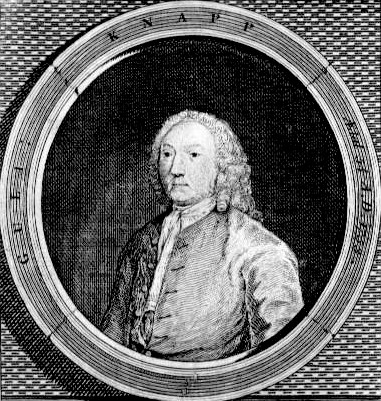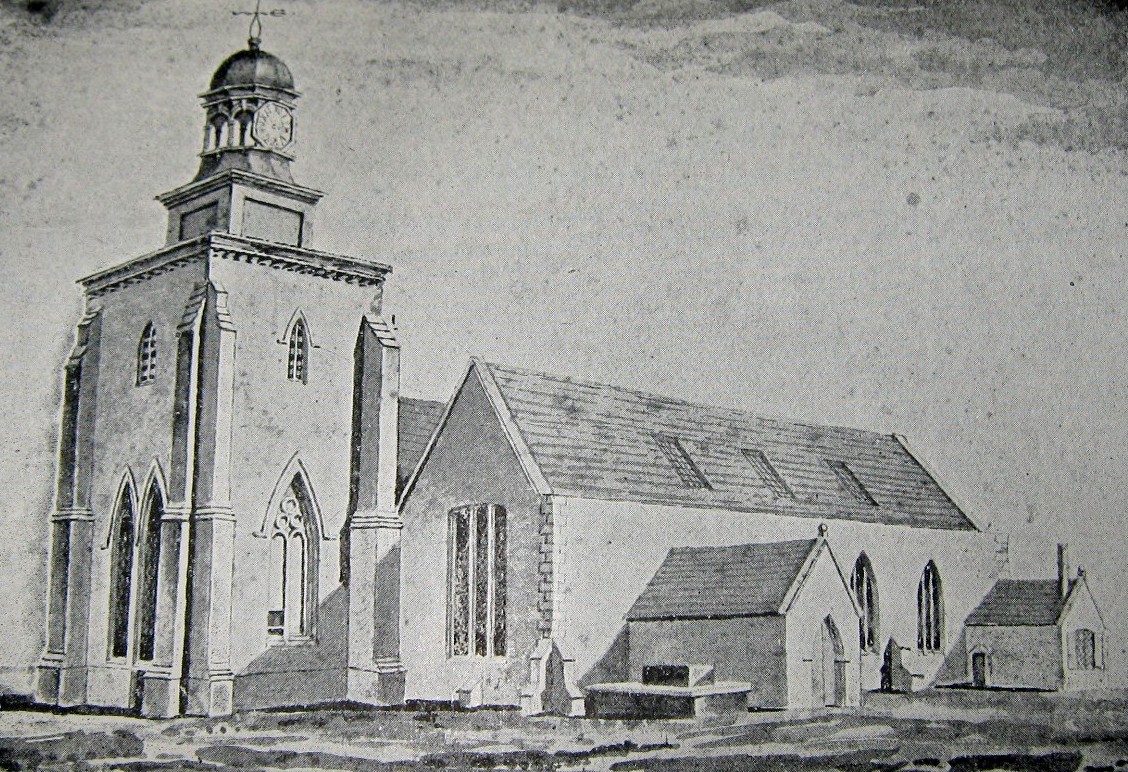|
William Knapp (1698-1768)
by Francis Roads, February 2021
Knapp was certainly the most popular composer of the eighteenth century amongst West Gallery quires. We know this from the many manuscript and printed copies of his works, which are often unattributed. Knapp was a glover by trade, and from 1728 parish clerk of St James Parish Church, Poole. He seems to have found time to teach psalmody to choirs in his area, as well as that of his own church. His portrait shows a dour, perhaps reserved man, and he appears not to have been universally popular. A Poole resident, one Henry Price (1702-50), a local poet and classical scholar, wrote:
From pounce and paper, ink and pen, Save me, O Lord, I pray;
From Pope, and Swift, and such-like men, And Cibber’s annual lay.
From doctor’s bills and lawyer’s fees, From ague, gout and trap;
And, what is ten times worse than these, George Savage and Will Knapp.
| | 
|
Tradition has it that Henry had been rebuked by Knapp and the sexton, Savage, over a hiccupping incident in church. However, Price was the author of the poem shown below, as well as giving Knapp a metrical version of text from the burial service for setting. It is also known that Knapp was involved in litigation over some rented properties. Knapp died intestate in 1768, surviving his wife and both his daughters.
|

Old St.James Church, Poole
| Knapp’s music is largely intended for unaccompanied tenor-led four part choir, and that is how his own choir at St. James sang. In 1767, a year before Knapp’s death, there was a proposal to erect an organ in the church, but it was firmly rejected by parishioners, perhaps under Knapp’s influence. But in the church records for 1794 there are bills for strings for the “church bass” (cello) and the repair of a clarinet, so by that time the church had a band. And in 1799 an organ was finally installed in the singing gallery. The church was rebuilt in 1820, and a record in the new church speaks of a band comprising “two fiddles, clarinet, bass viol and drum.” Even in Knapp’s own time, the fashion for unaccompanied singing was waning.
|
Knapp had a good understanding of the needs and capabilities of an amateur church choir. His vocal lines are free from awkward intervals and extremes of compass. Professor Nicholas Temperley writes in the New Grove Dictionary of Music and Musicians (Oxford, 2003 edition): “Knapp had an undoubted flair for effective melody, and occasionally succeeded in expressing deep emotion, as in his anthem The beauty of Israel is slain with its touching refrain, 'How are the mighty fallen'.
Knapp published 91 pieces in three collections listed below. 12 are known to be by other composers, and some are of doubtful authorship.
A Sett of New Psalm-Tunes and Anthems (1738) [SNPT]
Anthems for Christmas Day (1744) [ACD]
New Church Melody (1753) [NCM]
SNPT ran to eight editions, the last of which was issued posthumously in 1770, with 19 strophic pieces, 17 anthems and two canons. It also included a 37-page “Introduction to Psalmody, after a Plain and Familiar Manner,” written in dialogue form (see below). ACD was never reprinted. It had eight carols or hymns, and, despite its title, a single anthem. NCM had five editions up to 1765, with 30 strophic settings, and 14 anthems. The image shows the last two bars of Sturminster Tune, and the first six of Wareham Tune, the best known of all Knapp’s tunes.
Knapp’s anthems usually follow the pattern of full choruses separated by more thinly scored passages for three, two or only a single unsupported part. In SNPT, Knapp provides anthems for all the major church festivals, the four Royal Services, and weddings, funerals and Communion. Knapp also suggests metrical psalm settings for most of these, though they do not always correspond with the Proper Psalms listed in the Book of Common Prayer.
In NCM, the emphasis changes, though the style does not. There are only three occasional anthems, for wartime, thanksgiving for victory, and re-establishment of peace. In 1753 the second Jacobite rebellion would have been a recent memory.
Knapp’s strophic tunes in SNPT fall mostly into two categories: plain tunes, and relay or duet relay tunes. These are those where voices singly or in pairs sing one line of text at a time, followed by a full chorus. Those in ACD are also mainly plain, but in NCM Knapp’s style changes. There are plain tunes as before, but many more in the then newly fashionable fuguing style, and there are no relay tunes at all. Knapp was already familiar with fuguing technique, as he uses it in some of the anthems in SNPT, but here he applies it to strophic settings as well.
There is doubt over the authorship of some of these tunes, seven of which had appeared seven years previously in Michael Beesly’s A Collection of 20 New Psalm Tunes (Oxford 1746). Knapp does not acknowledge any other composer for these tunes, as he does for the anthems which he has taken from elsewhere. However, Temperley’s Hymn Tune Index (Oxford 1998) does not give attributions for any of the strophic tunes in NCM.
The fact remains that the great majority of Knapp’s published pieces are his own work, and as suitable now for any amateur choir as they were in the 18th century.
The following poem by Henry Price was printed in the front pages of New Church Melody.
“To Mr Knapp, on the Publication of his Book of Psalmody:
For ever pleas'd in Publick to commend,
And show the World the Merit of a Friend,
The gen'rous Muse from vile Detraction free,
Inscribes this lay with Gratitude to thee.
Thy tuneful Voice each list'ning Youth inspires
And with Devotion fills our hallow'd Quires,
Thy various Notes in just Proportion bound,
Improve the native Harmony of Sound.
Soon as I trembling hear thy moving Tongue,
I swell with Rapture at the sacred Song:
In vain the Nymph displays her blooming Charms,
In vain she tempts me to her circling Arms,
My conscious Soul with Scorn rejects her Love,
And tow'ring rises to the realms above.
Long as the Sun's enliv'ning Glories shine,
So long shall last this Deathless Work of thine,
And future Worlds with one Consent agree,
Whene'er they sing to God, to mention thee.”
PDF of A Set of New Psalms & Anthems, 8th Edn.
Music example:
Anthem VI: Anthem for May 29th (Oak Apple Day) , pg.96
Footnote: Information about St. James’s Church, Poole, kindly provided by Paul Guppy.
The original article by Dave Townsend can be found HERE
|